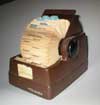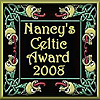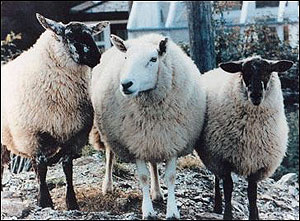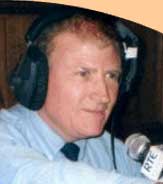| |

Traditions, folklore, history and more. If it's Irish, it's here. Or will be!
"People will not look forward to posterity who never look backward to their ancestors."
-Edmund Burke




Quotes
Library: Books, Movies, Music
Prints & Photos
Poetry
Jokes


Shops Ireland
Bunús na Gaeilge
(Basic Irish)
Circle of Prayer
Blessings
Did You Know?
Himself/Herself
Write to Us
Readers Write..
Links/Link to Us
Advertise with us
Awards & Testimonials
Submissions Guide


|
|
|
"Spakes from Wicklow"
by Mattie Lennon

Look what we've done to the old mother tongue
It's a crime the way we've misused it
It's been totally disgobbled
Pulverised and gollywobbled,
We've strangled, mangled, fandangled
And abused it.
So the song says. But did we do it any damage? John Dryden said that a thing well said will be wit in all languages. In my part of Wicklow the transposition of vowels seemed to be almost as popular a pastime as locking referees in car boots. And did it do any damage? No..I'm not asking about depriving the GAA arbitrator of his liberty on a winter's day in Rathnew, I'm referring to a bit of re-adjustment of the A, E, I, O and U's.
In my part of the world the language of Synge survived into the final decades of the twentieth century and beyond. Only recently a neighbour with a somewhat defective ticker told me that he had been fitted with a "Peace-maker". I know of a case where a lady with notions asked an apprentice carpenter to make a "Mate-Seaf". Nowadays, incredulous gazes meet the disclosure that it used to take a lot of courage, in Kylebeg, to say tea instead of "tay"; and to refer to unpolluted H2O as anything other than "clane wather" meant you were getting above your station. You'd soon be reminded that it wasn't long since you didn't have an arse in your "brutches".
The "hins" were fed off the "led" of a pot; when it was necessary to communicate with absent relatives the "pin an' ink" were taken down; and that reviled member of the rodent species was called a "rot". It would be said of the less-than-honest they'd "stale the milk oua yer tay". A welcome visitor would be invited to "take a sate an' give yerself a hate" and if you weren't "plazed" by a frank comment, you were said to be "aisy effinded" - you were sure to be "med game of". The single arch spanning a "strame" was a "brudge"; those who through hard work or a windfall would progress from thatch to a "toiled" or " ganvalized" roof on their dwelling, and every County Council cottage had an outside "labatery".
A "dacent little girl" was an unmarried female, of any age, who wouldn't let a male in a mile of her. Whatever about the Catechism definition of Grace, in our part of the world it was "the juice o' fat mate". And if you were of an argumentative dispossession it would be said that you "would rise a row about the kay o' the dure". Songwriting was easier here than elsewhere because floor rhymed with sure and bowl rhymed with howl. A snob might have "a collar an' tie on his nick an' a watch on his wrust" but no male would go so far as to sport a "gould" ring. Nobody would admit to having "flays" themselves but would comment that a certain neighbour's house was "walkin wud thim".
You could expect a "could day whin the win' was from the aist". Ewes "yaned", you ploughed "lay" and you "bilt the "kittle"- unless it "laked". You "gothered" the sheep, "muxed" the pig-feeding and you could "bate" the living daylights out of someone "whin timpers ed be ruz". But in such "is-there-no-one to-hould-me-coat" situations there was usually someone to make "pace". The piece of binder twine used to restrict the movements of the canine was a "lade". Beyond was "beyant" and an old neighbour of mine went so far as to do a bit of consonant-juggling resulting in "belant".
The clothes were held on the line by "pigs" and a brave man - or maybe one who didn't have the courage to run away - was described as a "hairo". Looking back on it now I reckon that the hillbillies of the old black-and-white Westerns with their "varmint" and "critters" would have fitted in perfectly in the Lacken of my youth. And I'm sure they would have adapted very quickly to describing the economy-conscious as "mane" and making stirabout from "yalla male".
If you are not from my neck of the woods perhaps like D.H. Lawrence you will marvel: "That such trivial people should muse and thunder in such a lovely language". If, on the other hand, you were reared anywhere between Knockatillane and Shillealagh you will recognise ".....that dear language which I spake like thee".
Notes:
Mattie pushed a few buttons with this article. The wonderfully odd, to our ears, pronunciations from Wicklow revive interesting questions. Many of us are familiar with the theory that speech from isolated areas harkens back to standard usage of centuries ago.
Bill Bryson in his delightful book, The Mother Tongue, describes a number of good examples.
In letters from the seventeenth, eighteenth and even nineteenth centuries scholars determined that boiled was pronunced byled, that join was jine, that merchant was marchant. He points to misspellings of Queen Elizabeth (the first, of course) that indicate work was pronounced wark, person was parson, heard was hard and the virgin queen pronounced defer - defar.
It has been often said that the mountain people of the United States speak, today, as Shakespeare spoke in the seventeenth century and Shakespeare sounded more American than english. Bryson says “...well, perhaps. But in fact if he and his compatriots sounded like anything modern at all it was more probably Irish.”
Humm, there’s a thought. Bryson goes on “For example, the Elizabethans, unlike modern English speakers, continued to pronounce many er words as ar ones, rhyming serve with carve and convert with depart.”
Mattie’s examples do not all fit the mould but some do. Is it too much of a stretch to imagine that the good people of Wicklow are holding fast to what was once the proper way to speak?
- Russ
 To read more from and about Mattie Lennon please click Tribute to Eamon Kelly. You'll find Matties bio at the end. To read more from and about Mattie Lennon please click Tribute to Eamon Kelly. You'll find Matties bio at the end.
We'd like to thank Mattie for enabling us to listen in on the lilt of Wicklow. To read more of his stories visit his website at Mattie Lennon.
Image: Photo Credit: Wicklow Cheviot Sheep Owner's Association
|
|
Fri, Sep 27, 2024
 The Galway Hooker The Galway Hooker
This unique vessel, with its distinctive curved lines and bright red sails, originated in the village of Claddagh. During the 19th century, hookers supported a significant fishing industry and also carried goods, livestock and fuel. Seán Rainey is remembered for building the last of the original boats, the Truelight, for Martin Oliver who was to become the last king of the Claddagh; as king, he was entitled to white sails on his boat. Since the mid seventies, many of the old sailing craft which were on the verge of extinction have been lovingly restored and new ones have been built. During the summer months they can be seen at festivals such a Cruinniú na mBád - the Gathering of the Boats - in Kinvara.
Click for More Culture Corner.
We have this book and it's a gem. We now wish we had this up-dated edition. But don't take our word for it - here's another opinion from an amazon reviewer: This is not your average travel book containing descriptions of places, events, lodging, exchange rates, etc. Instead, it gives the nitty gritty on how to conduct yourself in your day-to-day life. Especially enjoyable was the chapter entitled "Paddies", which gives a valuable groundwork in dispelling myths and stereotypes surrounding the Irish and Ireland. Entertaining and informative, this book will help visitors to Ireland get more out of their visit.
Click here for Culture Shock.
|
...for all 'decent skins', 'crawthumpers', horse-protestants', 'hard chaws' and 'strong farmers'...a dictionary of Irish slang that's as amusing as it is informative.
Click here for Slanguage
|
|
|
|
|




 The Galway Hooker
The Galway Hooker